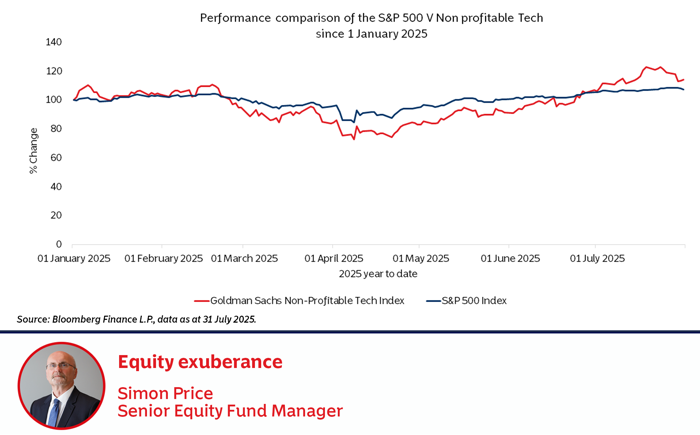
What this chart shows
Over the past quarter, we've seen a surprising trend of companies with limited prospects for building sustainable business models have attracted increased investor interest, outperforming higher-quality peers. The Goldman Sachs Non-Profitable Tech Index serves as a useful proxy for this phenomenon, tracking firms with high leverage, weak profitability, or otherwise fragile business fundamentals. The chart illustrates the index’s volatile journey through 2025, sharply contrasting with the steadier performance of the S&P 500 Index.
Why this is important
Recognising the current investment environment, where companies with high valuations and questionable growth prospects are thriving, is essential. These firms often rely heavily on capital markets for funding and return little to shareholders. Their recent outperformance has been supported by a low-volatility backdrop and abundant market liquidity, conditions that may not persist indefinitely.
While momentum-driven, non-fundamental trends may be tempting, we remain committed to our long-term investment philosophy: focusing on high-quality companies with proven track records of outperformance across market cycles. Despite strong returns in Q2, some driven by questionable fundamentals, we believe now is an opportune time for investors to rebalance toward quality and durability, especially given the potential for rapid shifts in market leadership amid ongoing macro uncertainty.
Central banks in the US, UK, and EU signalled shifting policy stances amid soft data, inflation concerns, and trade pressures, driving rate-cut bets and market repositioning. Globally, geopolitical flashpoints and weak Chinese economic signals shaped investor sentiment and capital flows.

-
A pair of Fed governors publicly pushed for faster rate cuts after weak jobs signals, with one arguing for up to three cuts this year.
-
Markets braced for fresh inflation data (July CPI) and tariff-driven price pressures – analysts warned tariffs could push inflation higher in coming months.
-
US investment-grade corporate bond market notches up biggest inflows since 2020.
-
The premium for gold futures in New York over spot prices jumped Friday after the FT reported the US added a surprise tariff on the imports of 1 kilogram bars. It’s not clear whether the tariffs are already in force and if they apply to all countries.

-
The Bank of England’s (BoE) Monetary Policy Committee voted to reduce Bank Rate by 25 bps to 4.00% at its latest meeting on 6 August, as expected.
-
The BoE released its August monetary policy report reiterating cautious growth prospects and near-term upside inflation risks – signalling data dependence ahead.
-
Markets reacted to the cut with close attention to gilt yields and sterling moves as investors re-priced UK rate expectations.
-
Reeves hopes promise of fairness will cushion potential Budget tax rises. People close to the UK chancellor say she has begun drawing up a list of measures she may tighten in the autumn.

-
Swiss President Karin Keller-Sutter left Washington without securing a reduction in the 39% tariff imposed by Trump.
-
The ECB launched/announced forward-looking initiatives (e.g., public engagement on future euro banknote design and related consultations).
-
A report by the European Central Bank (ECB) revealed that between 2015 and 2022, approximately 240,000 jobs in eurozone manufacturing (notably in auto and chemicals) were lost or relocated due to competition from Chinese producers. These industries now face renewed threats amid shifting global trade dynamics.
-
European Parliament adopted a decision to update the list of high-risk third countries with strategic deficiencies in anti-money laundering and counter-terrorist financing regimes. One of the most significant developments was the removal of the United Arab Emirates (UAE) from this list.

-
UN ambassadors condemn Israel's 'dangerous' Gaza City plan as Netanyahu denies starving Palestinians. Israeli Prime Minister Benjamin Netanyahu defends his government's plan to take over Gaza City, claiming it is the "best way" to end the war.
-
US President Donald Trump will meet with Russian President Vladimir Putin on August 15 in Alaska to negotiate an end to the war in Ukraine. Zelenskiy said Ukraine won’t cede territory to end the war with Russia, which has international support. NATO’s Mark Rutte told ABC that any progress toward peace would require territory to be “on the table” in negotiations.
-
Japanese investors sold foreign stocks for a third straight month in July, taking profits after a steep rally left valuations stretched, while channelling large sums into higher-yielding foreign bonds as a weakened yen boosted returns.
-
China's producer prices fell more than expected in July, while consumer prices were unchanged, underscoring the impact of sluggish domestic demand and persistent trade uncertainty on consumer and business sentiment.
